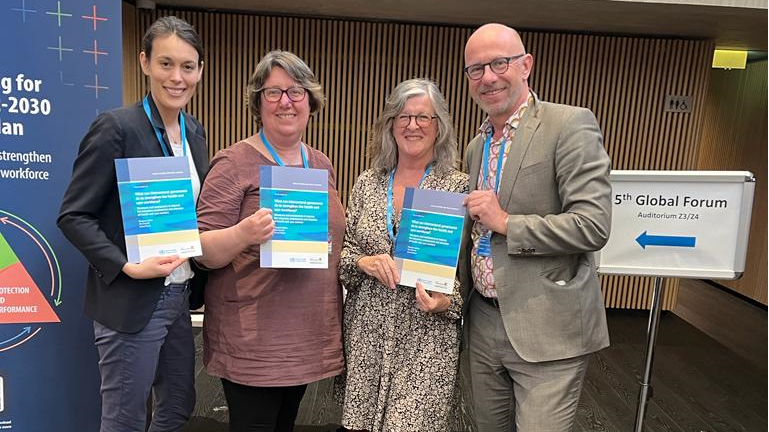
The Fifth Global Forum on Human Resources for Health is taking place in Geneva, throughout this year’s Global World Health Worker Week. A delegation of staff from LSTM has been at the event to help launch a new policy brief: ‘What can intersectoral governance do to strengthen the health and care workforce: Structures and mechanisms to improve the education, employment and retention of health and care workers?’
The LSTM team worked with colleagues from the World Health Organization (WHO) and the European Observatory on Health Systems and Policies to produce the new policy brief that works up intersectoral solutions to issues faced by the global health workforce. The policy brief has been published by the European Observatory on Health Systems and Policies and is being launched at the event.
The brief makes recommendations, based on lessons learned from the COVID-19 pandemic to inform health system policies, looking at how to work across sectors to educate, employ and retain a sustainable health and care workforce (HCWF). The long-term aims of the policy brief are to deliver on the ambitions of universal health coverage (UHC), health security, and the Sustainable Development Goals (SDG).
Speaking at the launch of the brief, one of the brief’s authors, Joanna Raven of the Department of International Public Health, said: “The key messages from our brief were reflected in the opening remarks of Dr Tedros Ghebreyesus, the WHO Director General, at the Fifth Global Forum - we must act together and work across all sectors to protect and invest in the health and care workforce.”
LSTM’s Margaret Caffrey, who co-authored the policy brief, added, “Political leadership, governance, and intersectoral collaboration and action are critical to strengthening the health and care workforce, while building the capacity to generate, use and disseminate quality data is also critical for evidence-based policy making.”
As well as launching the brief, the Forum – a high-level WHO event – also hosted a roundtable on Education and Employment in the Health and Care Sector taking the brief as a focus for discussion.
Panellists reflected on the policy brief and recognised the relevance and importance of the recommendations for intersectoral collaboration and action. The discussion focused on the whole of government approach to educating, employing, and retaining a sustainable HCWF. Central to this approach are sustained political will, trusting partnerships, and investment in education to meet population needs.
The policy brief’s key messages are aimed at national-level governments and include:
1. Providing political leadership from the top can set an agenda for HCWF development across the whole-of-government and the whole-of-society
2. Making intersectoral collaboration effective means sustained investment in relationships with key sectors and strategies that build trust
3. Countries need to strengthen intersectoral governance mechanisms to make them work for the HCWF agenda
4. The health and care sector needs to develop reliable data and forecasting if other sectors are to take it seriously
5. Governments need to change the investment narrative for the health and care sector and spell out the co-benefits for other sectors of investment in the HCWF
Download the policy brief here: https://rb.gy/dlucx